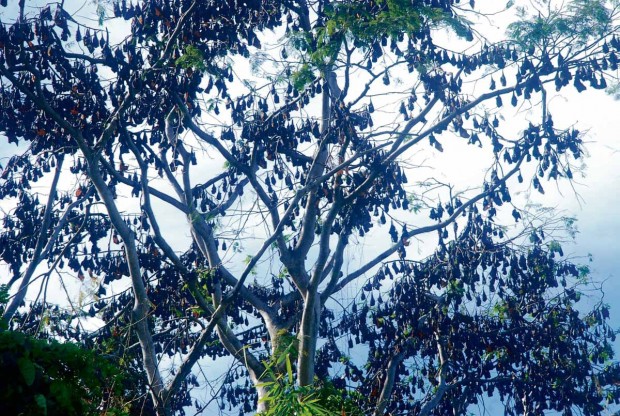Army base projects raise fears for Subic bats

BATS roost on a tree inside the Subic Bay Freeport Zone. Plans to expand the military base inside the former US naval station are worrying
conservationists who expressed fears about the projects’ effects on bat habitats. ALLAN MACATUNO/INQUIRER NORTHERN LUZON
SUBIC BAY FREEPORT—The military base expansion of the Armed Forces of the Philippines toward the forests inside this free port has drawn concern from conservationists because of its potential impact on the habitat of fruit bats thriving there, an official here said.
Roberto Garcia, chair of the Subic Bay Metropolitan Authority (SBMA), said the agency is closely monitoring the population of two species of bats dwelling in the free port’s forest, after groups expressed apprehension that increased human activity near the animals’ habitat would disrupt the bat community and deplete their population.
“We’re trying to protect the habitat [of the Acerodon jubatus or giant golden-crowned flying foxes, and the Pteropus vampyrus lanensis or Philippine giant fruit bat] since bats are known to be sensitive to noise,” said Garcia in a news conference on Monday.
“There are conservation efforts being done,” he said.
These bats roost in the vicinity of the Subic Bay International Airport, which will undergo a major upgrade to house some of the Philippine Air Force’s latest equipment and aircraft.
A smaller roost of the flying foxes is found in the naval magazine area, which will also be rehabilitated to house soldiers and civilian military personnel.
“Once the military expansion gets underway, I’m worried that habitat of the bats will be disturbed,” Garcia said.
As of January this year, the ecology center had recorded at least 18,700 bats in the forest.
The population of bats here has increased over the years, Garcia said, noting that there were only about 12,000 bats in 2014.
“The growing bat population inside the free port means they continue to thrive in our forest here and the challenge now is how to protect their habitat,” he said.
On Saturday, a fund-raising event was held here to benefit the local nonprofit organization Wildlife in Need (WIN) Foundation.
“We work very hard to provide the best possible care and welfare for the rescued animals at our center,” said Gail Laule, president of WIN.
The WIN Rescue Center here provides food, housing and medical care for rescued animals, such as bats, birds and snakes. Allan Macatuno, Inquirer Central Luzon































